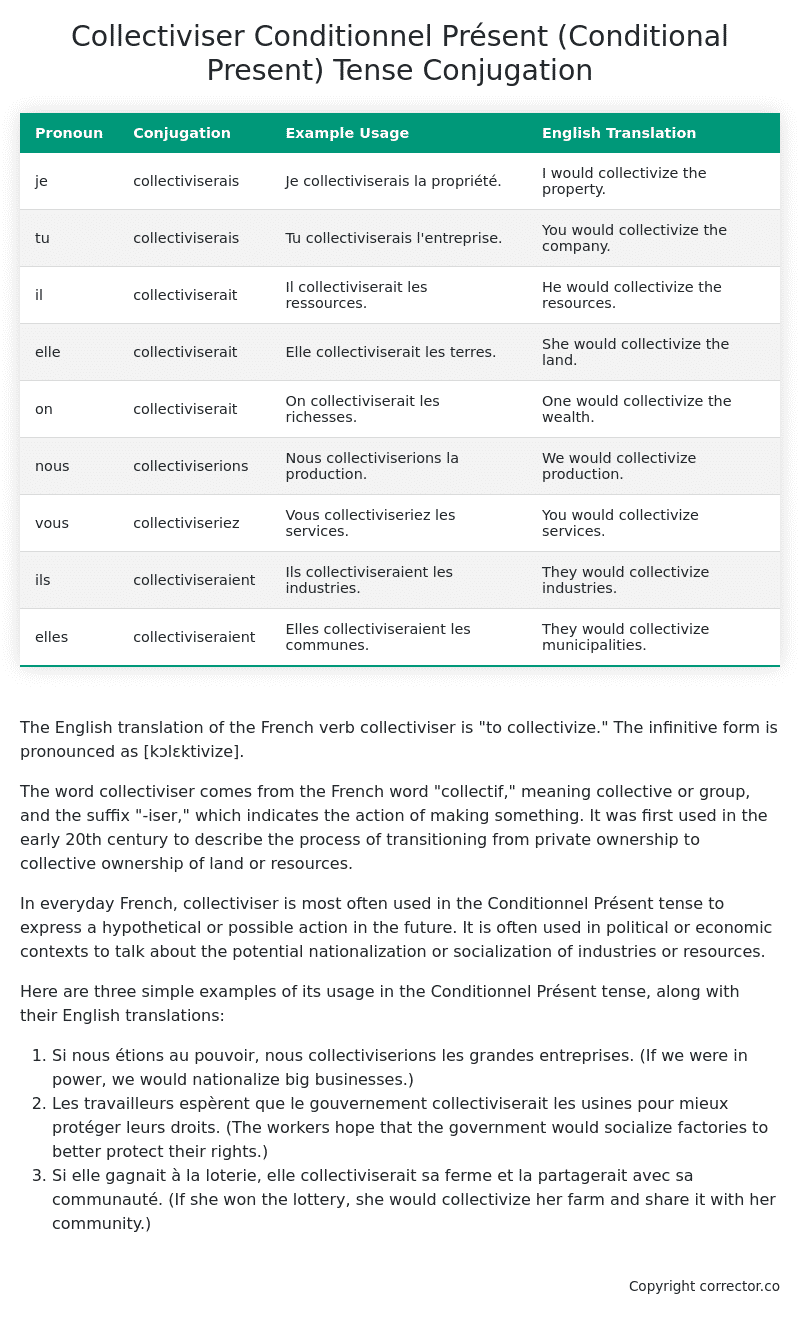Conditionnel Présent (Conditional Present) Tense Conjugation of the French Verb collectiviser
Introduction to the verb collectiviser
The English translation of the French verb collectiviser is “to collectivize.” The infinitive form is pronounced as [kɔlɛktivize].
The word collectiviser comes from the French word “collectif,” meaning collective or group, and the suffix “-iser,” which indicates the action of making something. It was first used in the early 20th century to describe the process of transitioning from private ownership to collective ownership of land or resources.
In everyday French, collectiviser is most often used in the Conditionnel Présent tense to express a hypothetical or possible action in the future. It is often used in political or economic contexts to talk about the potential nationalization or socialization of industries or resources.
Here are three simple examples of its usage in the Conditionnel Présent tense, along with their English translations:
- Si nous étions au pouvoir, nous collectiviserions les grandes entreprises. (If we were in power, we would nationalize big businesses.)
- Les travailleurs espèrent que le gouvernement collectiviserait les usines pour mieux protéger leurs droits. (The workers hope that the government would socialize factories to better protect their rights.)
- Si elle gagnait à la loterie, elle collectiviserait sa ferme et la partagerait avec sa communauté. (If she won the lottery, she would collectivize her farm and share it with her community.)
Table of the Conditionnel Présent (Conditional Present) Tense Conjugation of collectiviser
| Pronoun | Conjugation | Example Usage | English Translation |
|---|---|---|---|
| je | collectiviserais | Je collectiviserais la propriété. | I would collectivize the property. |
| tu | collectiviserais | Tu collectiviserais l’entreprise. | You would collectivize the company. |
| il | collectiviserait | Il collectiviserait les ressources. | He would collectivize the resources. |
| elle | collectiviserait | Elle collectiviserait les terres. | She would collectivize the land. |
| on | collectiviserait | On collectiviserait les richesses. | One would collectivize the wealth. |
| nous | collectiviserions | Nous collectiviserions la production. | We would collectivize production. |
| vous | collectiviseriez | Vous collectiviseriez les services. | You would collectivize services. |
| ils | collectiviseraient | Ils collectiviseraient les industries. | They would collectivize industries. |
| elles | collectiviseraient | Elles collectiviseraient les communes. | They would collectivize municipalities. |
Other Conjugations for Collectiviser.
Le Present (Present Tense) Conjugation of the French Verb collectiviser
Imparfait (Imperfect) Tense Conjugation of the French Verb collectiviser
Passé Simple (Simple Past) Tense Conjugation of the French Verb collectiviser
Passé Composé (Present Perfect) Tense Conjugation of the French Verb collectiviser
Futur Simple (Simple Future) Tense Conjugation of the French Verb collectiviser
Futur Proche (Near Future) Tense Conjugation of the French Verb collectiviser
Plus-que-parfait (Pluperfect) Tense Conjugation of the French Verb collectiviser
Passé Antérieur (Past Anterior) Tense Conjugation of the French Verb collectiviser
Futur Antérieur (Future Anterior) Tense Conjugation of the French Verb collectiviser
Subjonctif Présent (Subjunctive Present) Tense Conjugation of the French Verb collectiviser
Subjonctif Passé (Subjunctive Past) Tense Conjugation of the French Verb collectiviser
Subjonctif Imparfait (Subjunctive Imperfect) Tense Conjugation of the French Verb collectiviser
Conditionnel Présent (Conditional Present) Tense Conjugation of the French Verb collectiviser (this article)
Conditionnel Passé (Conditional Past) Tense Conjugation of the French Verb collectiviser
L’impératif Présent (Imperative Present) Tense Conjugation of the French Verb collectiviser
L’infinitif Présent (Infinitive Present) Tense Conjugation of the French Verb collectiviser
Struggling with French verbs or the language in general? Why not use our free French Grammar Checker – no registration required!
Get a FREE Download Study Sheet of this Conjugation 🔥
Simply right click the image below, click “save image” and get your free reference for the collectiviser Conditionnel Présent tense conjugation!

Collectiviser – About the French Conditionnel Présent (Conditional Present) Tense
Formation
Common Everyday Usage Patterns
Expressing Polite Requests
Expressing Hypothetical Situations
Expressing Doubt or Uncertainty
Interactions with Other Tenses
Present Tense
Past Tense
Future Tense
Conditional Perfect
Summary
Want More?
I hope you enjoyed this article on the verb collectiviser. Still in a learning mood? Check out another TOTALLY random French verb conjugation!


